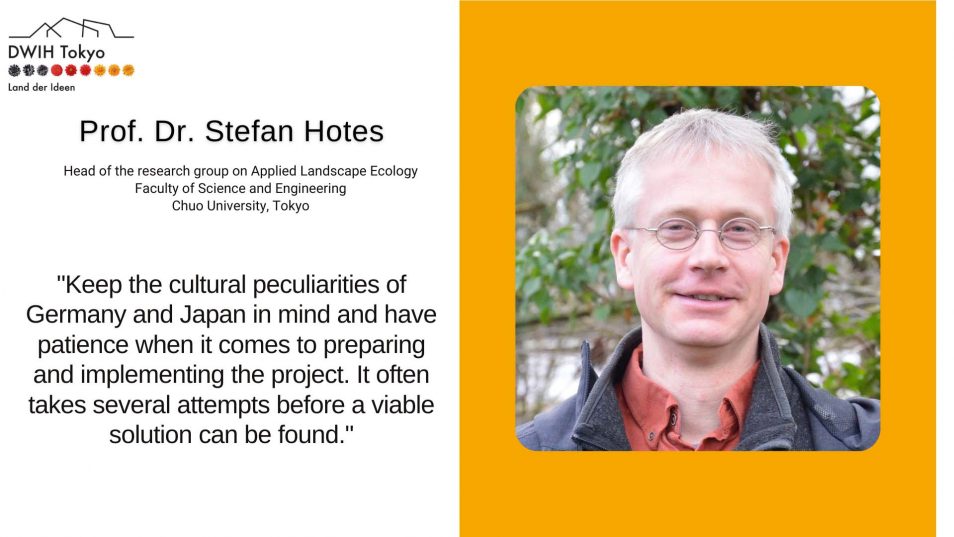Prof. Dr. Stefan Hotes
 © DWIH Tokyo / Prof. Dr. Stefan Hotes
© DWIH Tokyo / Prof. Dr. Stefan Hotes
Our new series “Connecting East and West – A Short Interview with…“ presents people involved in German-Japanese research collaborations – and their insights on how and where to cooperate successfully!
This week, Prof. Dr. Stefan Hotes, who is a professor at the Laboratory of Applied Landscape Ecology at Chuo University in Tokyo, shares his insight into scientific relations between Japan and Germany as well as advice for prospective researchers.
1. What kind of research makes you excited, and why?
Research on sustainability. In the holistic interpretation of the term, as used in the discussions regarding the United Nations Sustainable Development Goals (SDGs), the topic includes the dynamics of natural and anthropogenic systems. Ultimately, it is about what is probably the most ambitious research goal we can set for ourselves in the Anthropocene: a comprehensive understanding of the interactions between us humans and our environment that is applicable to the sustainable management of socio-ecological systems in order facilitate human existence within the framework of a long-term resilient environment.
2. What is your connection to Japan/Germany?
I was born and raised in Germany and my first visit to Japan was as an exchange student.
3. Where should Japan and Germany cooperate more?
In interdisciplinary research on the function and regulation of linked ecological and socio-economic systems.
4. What is your winning formula for research cooperation?
A thorough discussion of the expectations of the cooperation partners, a good balance between firmly agreed goals and flexible adaptation to dynamic developments during the project, and coordination that keeps an eye on the research outcome as well as the human aspects of the joint project.
5. What advice do you have for Japanese/German researchers looking for joint projects?
Keep the cultural peculiarities of Germany and Japan in mind and have patience when it comes to preparing and implementing the project. It often takes several attempts before a viable solution can be found.
Prof. Dr. Stefan Hotes
• First came to Japan as high school exchange student and again during his university studies (focus on ecology and nature conservation)
• Scientific work on the role of geological events (volcanic eruptions, tsunamis) for the dynamics of the vegetation of mires
• Coordinated inter- and transdisciplinary research projects on sustainable land use
• Engaged in activities at the science-policy interface, e.g., for the UN Convention on Biological Diversity (CBD) and the Intergovernmental Platform on Biodiversity and Ecosystem Services (IPBES)
• Since 2019: Head of the research group on Applied Landscape Ecology at the Faculty of Science and Engineering, Chuo University, Tokyo.
Contact information: Chuo University, Faculty of Science and Engineering, Applied Landscape Ecology, 1-13-27 Kasuga, Bunkyo-ku, Tokyo 112-8551, Japan
Tel.:+81-(0)3-3817-7298, E-mail:s.hotes.25t@g.chuo-u.ac.jp
To read other articles related to the DWIH Tokyo Interview, click here.
The DWIH Tokyo newsletter provides timely information about open calls and events from research and innovation in Germany and Japan: Click here to register for the newsletter in English
